There is a constant debate about the ideal number of people to play games with. Of course the truth of the matter is that is depends what game you’re playing. Three people is not going to make for a very good game of Witness and don’t even get me started on two-player Times Up! However we do often find ourselves with just one other friend or SO when the hankering to play a game rolls around. What is the perfect one to pull off the shelf at that time? Here is a list of ten of our favourite 2-Player Games. Some of these are not limited to only two players, but that is when they really rock. Here they are in no particular order, are some of the best games to play with just one other person.
7 Wonders Duel
This games does what I didn’t think was possible. It solves the drafting problem of the original 7 Wonders and makes it a perfect two-player showdown. I was skeptical when I saw this game announced, but with the brilliant minds of Antoine Bauza and Bruno Cathala behind it, there should be no surprise that Duel is a winner.
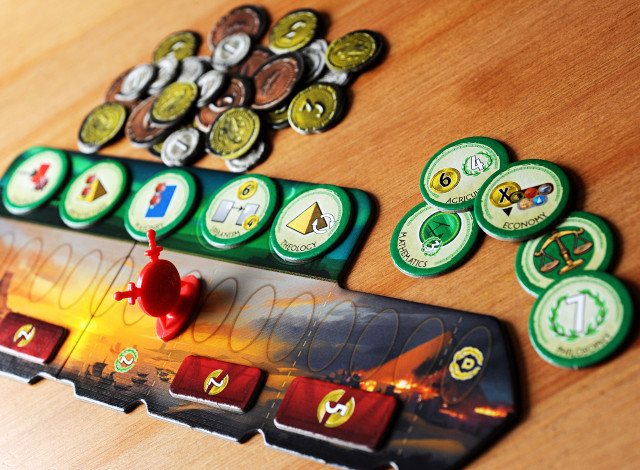 Each age a pyramid of cards is created with some visible and some hidden to the players. As the cards get drafted more parts of the pyramid become available. Duel introduces the possibility for instant victories through Science or Military. You can’t ignore either or your opponent could win before you’ve even had a chance to add up your points.
Each age a pyramid of cards is created with some visible and some hidden to the players. As the cards get drafted more parts of the pyramid become available. Duel introduces the possibility for instant victories through Science or Military. You can’t ignore either or your opponent could win before you’ve even had a chance to add up your points.
It keeps enough of the original that you definitely feel as if you’re playing a 7 Wonders game, but different enough that it is a unique experience requiring a new approach. It takes one of my favourite games and turns it into a perfect two-player battle. I’m excited to see the directions they can take Duel with expansions.
Lost Cities
This was one of the first titles I got when I was getting into board games and while admittedly I don’t pull it out so often these days it stills hits a sweet spot. Lost Cities sends you on up to five different expeditions. The key is balancing the risk of starting a new mission versus the reward it might offer. Every time you start a mission you’re on the hook for a minimum of twenty points. Can you you make 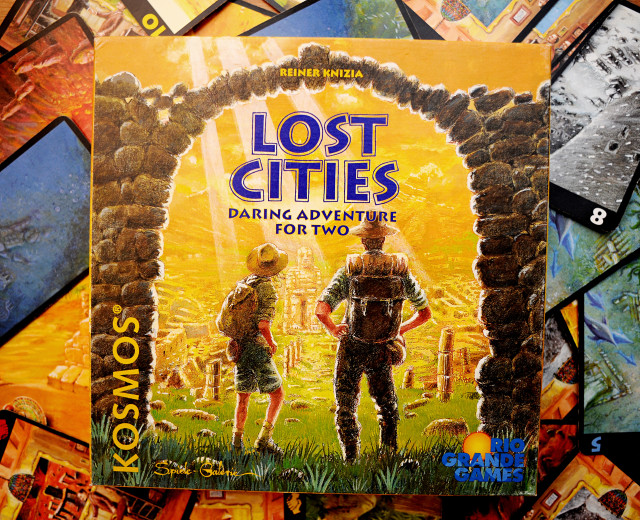 it? Or will you have to pay the price. Well, a lot has to do with predicting what your opponent is trying to do and adjusting your play accordingly. On a turn you play or discard a card and draw back up. When playing cards on a mission they must always go up in value. Sometimes you’ll play a higher value card and then immediately afterwards draw a card that would’ve been useful to you one turn ago…now it’s just trash in your hand.
it? Or will you have to pay the price. Well, a lot has to do with predicting what your opponent is trying to do and adjusting your play accordingly. On a turn you play or discard a card and draw back up. When playing cards on a mission they must always go up in value. Sometimes you’ll play a higher value card and then immediately afterwards draw a card that would’ve been useful to you one turn ago…now it’s just trash in your hand.
Lost Cities is fun and simple, but can have some pretty tense moments too. Many people would pick Battle Line as the best two-player Reiner Knizia game, but my vote goes to Lost Cities.
Dominion
No other game has taken over my life in the same way as Dominion. Part of it has to do with where I was with gaming when I really began to sink my teeth into it, but I conservatively estimate that 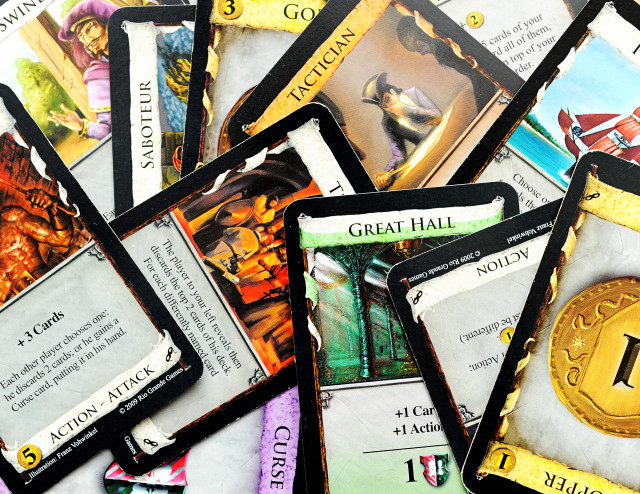 Dominion took over a year of my gaming life.
Dominion took over a year of my gaming life.
The first real deck-building game created a new genre essentially. I obsessed over the best combinations of cards to collect to synergize my deck. With expansions like Intrigue, Seaside and Prosperity…oh yeah and one other purplish one I can’t remember the name of, coming out in quick succession there were limitless possibilities to the different combination of kingdom cards that could make up your game. I’ve fallen off a bit with the later expansions, but this is one game that I would play any time someone was up for it. Dominion totally works for 3-4 players, but it can really sing with just two that really know what they’re doing. Many deck builders have been designed since this one, but I got nothing but love for the classics.
Hive
Hive is a abstract game based on insects and their movements. Your goal is to completely surround your opponent’s Queen Bee while protecting your own. It’s a bit like chess in that each piece has their  own movement style that you have to use to your advantage to capture your opponent.
own movement style that you have to use to your advantage to capture your opponent.
One of the neat things about Hive is that there is no board. You create the playing surface as you play. Players add their bugs from the start of the game making the “hive.” Once it’s been constructed the hive must stay connected. Pieces can be moved, but the structure must stay in one piece. You can always either add or move a piece. Learning the right time to bring out your different insects is really important. Like chess, learning the movements of the different pieces is easy, but mastering the strategy of the game can take a lifetime.
Carcassonne
Carcassonne was the next game I played after years of Settlers of Catan and one of the great things I loved about it was how well it played with two. I always refer to this game as competitive puzzle 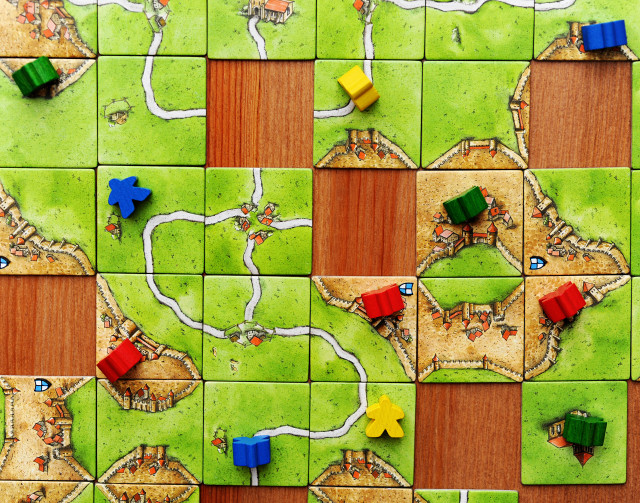 building as you and your opponent build a kingdom together, but work to control it with your farmers, knights, robbers and monks.
building as you and your opponent build a kingdom together, but work to control it with your farmers, knights, robbers and monks.
As a two-player game you’re able to set up combination moves to either block your enemy or steal some of their points. A lot of that is lost when you add in additional people. That’s not to say I’d never play Carcassonne with more, just not the ideal number in my opinion.
With all of the different expansions out there, it may be argued that there are some iterations of the game that work best with more players, but if we’re talking about the classic original title let me crack it out with one other person any day of the week.
Patchwork
I am a rarity in the board game circles I travel in, in the fact that I’m not a huge fan of Uwe Rosenberg’s heavier titles. Le Havre is very good and I’m just discovering Glass Road, but never got on the Agricola train. That being said, I quite liked Bohnanza and with all the buzz around Patchwork 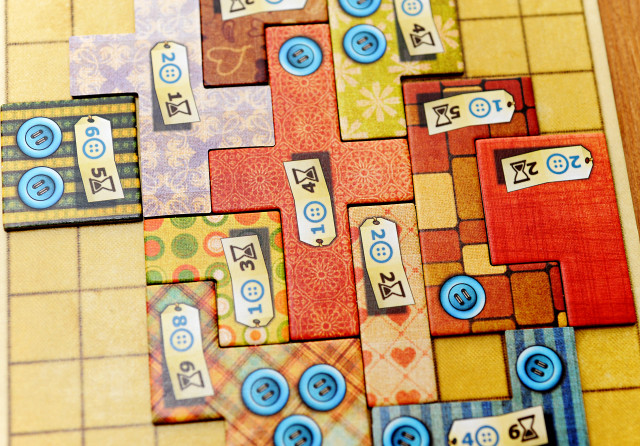 I needed to give it a shot. I can say I’m pretty glad I did. Patchwork is a game about putting together the best quilt possible while being efficient with your time and buttons (money). It’s a perfect puzzle as you try to game out what you can afford, where it can go in your play mat, and how to deny your opponent a piece they really need.
I needed to give it a shot. I can say I’m pretty glad I did. Patchwork is a game about putting together the best quilt possible while being efficient with your time and buttons (money). It’s a perfect puzzle as you try to game out what you can afford, where it can go in your play mat, and how to deny your opponent a piece they really need.
Patchwork may seem simple at first glance, but you have to consider the strategy on a whole bunch of different levels. There is a lot going on beneath this relatively simple premise. With the recent release of an iOS/Android version, Patchwork will be reaching more and more people. You can check out our complete review here.
Race for the Galaxy
RFTG is a game that a lot of people have trouble learning for the first time. It is highly reliant on iconography and until you learn those icons, it can seem like the game is designed in a foreign 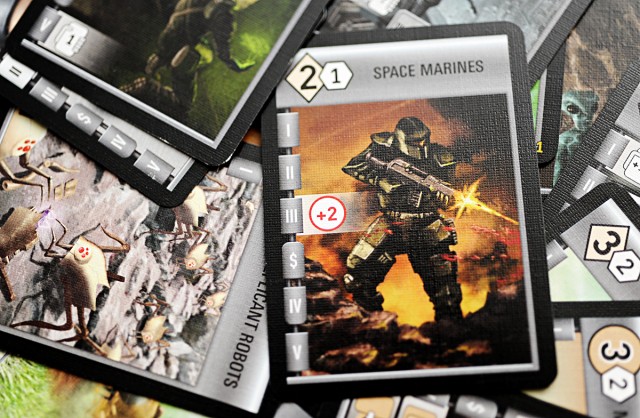 language. However, once you get past the first couple of plays Race is an amazing experience. It plays up to four, but I really feel like it shines as a two-player game.
language. However, once you get past the first couple of plays Race is an amazing experience. It plays up to four, but I really feel like it shines as a two-player game.
In RFTG the goal is to build an interstellar empire, settling and conquering planets, developing technologies, producing and trading goods, and exploring the reaches of the universe. You secretly select actions that will determine what you can accomplish in the round. Your opponent will do the same and then both are revealed. The neat thing is that you’ll both be able to do each selected action, but you’ll be able to do your choice a little better. One of the keys is to figure out your opponent’s best move and select an action for yourself that compliments that.
With players that know the game, RFTG can be banged out in about 20 minutes, but there’s a heck of a lot of game in that time. It can be an investment to learn, especially if you’re new to the hobby, but this is one of those games that’s worth the time.
Jaipur
Jaipur is one of the best hand management/market games out there. It has a rhythm and a flow to it that can work 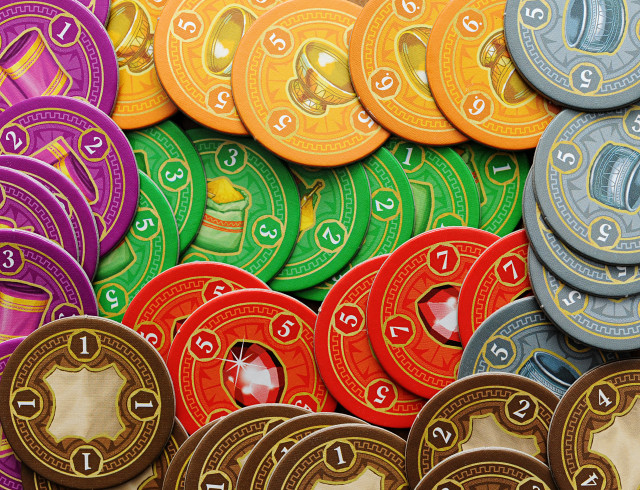 for you or against you depending on the game. The idea is to become the best merchant in the land to earn an invite to the palace.
for you or against you depending on the game. The idea is to become the best merchant in the land to earn an invite to the palace.
On your turn you’re either snagging goods or camels from the marketplace or selling those goods for profits. Figuring out when is the best time to acquire and when it’s best to sell is pretty darn important. Couple in the fact that you have to worry about a hand limit and it gets even tougher. This has always been a go to game in my collection for a fast challenge against one other person. You can see my full review of Jaipur here.
The Duke
The Duke is another modern take on chess…with a pretty amazing twist. The goal of the game is to capture your

The Duke
opponent’s Duke. The game begins with each player having only three pieces on the board; their Duke and two Footmen.
Each turn you either reach into a bag and grab a random piece to add to the board or move one of your pieces. You never know what character you’re going to draw, so your strategy is dictated a bit by luck. However, the really cool element is that every time a piece is moved it flips completely changing its movement properties. Imagine chess starting with only your King and two pawns on the board and every time you move you pieces they essentially become different. It can burn your brain to work your opponent into ‘checkmate’, but the randomness levels the playing field a bit and makes The Duke incredibly re-playable.
Attika
This is a bit of a mean one to put on a list, just because it can be tough to get your hands on. It’s been out of print for a while, but in small part, if articles like this may be able to generate calls for a reprint then they’re worth it. Attika is
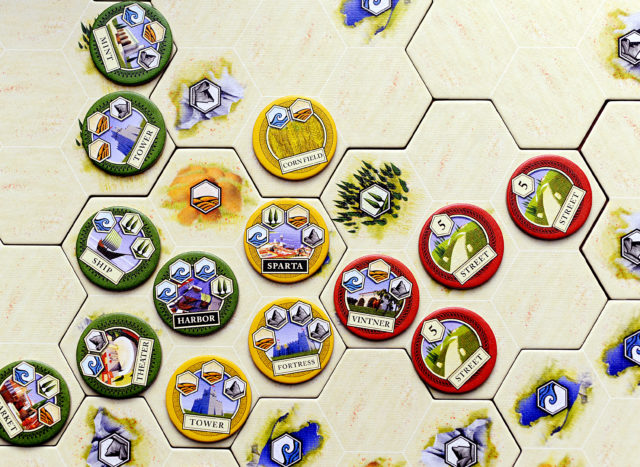
Attika
a game about building up your civilization on a shared landscape. Each player takes on the lead of an ancient Greek city and looks to lay out buildings on the board connecting two temples. If you’re able to build a continuous line between the temples you’ll gain victory for your people. However, your opponent is of course going to be working hard to get in your way and complete a line of their own.
Attika combines board control and resource management and while you can play this game with up to four, I highly recommend against it. Too many players makes this game dissolve into chaos. The streamlined two player experience makes for one of my favourite games of all time. You can see a full review here.
Honourable Mentions: Takenoko, Star Realms, Bruges, Hanabi, Citadels, Dragonheart, Castles of Burgundy, Steam Park, Seasons.
I concur with many of these but especially Attika. A classic game much deserving of a reprint.
Oh man, it’d be great if they reprinted!
-Nicole
Hi there,
You have really gathered a great list of 2- player games here. I love it.
I did not know the last 2 games, but the other ones are spot on.
A few comments:
Hive is an abstract. So it is not for everyone. You need an opponent that is willing to learn the game at the same pace as you.
Jaipur is much loved, but for some reason it did not click so much with me. It is a clever game though.
Race for the Galaxy, 7 Wonders Duel, Carcassonne and Dominion are all great games.
Finally, like you, I also have a sweet spot for Lost Cities. You are right. Schotten-Toten (=Battle Line) is often quoted as better than Lost Cities. I don’t think it is. It is also a great 2-player game but it is a little bit more brainy and I suppose less universal than Lost Cities (in the sense that it won’t please everyone).
Lost Cities is such an addictive game. Everyone should try it ( I have yet to find someone who did not love it when I taught it). If you have not had the chance to play it, have a look at the online board gaming platform Happy Meeple (http:www.happymeeple.com/en/)! A 3-minute tutorial will get you going. But beware! As I said, it is very addictive. Don’t blame me if you spend too much time there!
Keep up the good work and have fun!
Hi John, do you play the full board game of Lost Cities with just 2 people? Or are you referring to the card game version?
Have you ever played Akrotiri? Check it out, fantastic two-player.
Yes indeed! We’re big fans here – but gosh it’s hard to limit to 10 games 🙂
You can read Adam’s review of Akrotiri here: http://dailyworkerplacement.com/2015/01/01/first-look-akrotiri/
-Nicole
I second Akrotiri.
Plus I would add Trambahn and Biblios
Oh! I’ve not tried either of those 2p. Thanks for the suggestions.
-Nicole
Probably the best two-player list I’ve seen. Big thumbs up for including Jaipur and Patchwork, in particular.
Thanks! We love both those games. Too bad we had to limit it to 10!
-Sean
I strongly recommend checking out Super Motherload – best two player game I’ve played in years.
I’d really like to try it. I’ve heard nothing but good things!
-Sean
Favorite 2 player games:
1. Mini Tikal: https://boardgamegeek.com/filepage/25463/mini-tikal-101pdf
2. Trias
3. Alien Frontiers 2 is good, 3-5 great, 6 good
4. Exodus: Proxima Centauri
5. Belfort 2 is good, 3 great, 4 good, 5 ok
6. Heroes Incorporated works good with any player count
7. Runebound 2nd Edition (good with 3 players as well)
8. Mille Bornes
9. Memoir ’44
10. Stratego
Great list! I love me some Alien Frontiers!
-Sean
[…] Publicado no The Daily Worker Placement […]
Great list but one comment…
I’m sorry but Magic: the Gathering is the ORIGINAL new genre creating 2 player totally customizable collectible card game, not Dominion. ?
Chess !
I’m quite fond of Tash-Kalar if I want an abstract 2-player game that unlike Hive has some randomization. Doesn’t get enough love. I have yet to sample The Duke which I gather has some similarities (as does Onitama).
For me, Jaipur is enjoyable on occasion, but the lack of hidden information beyond the first 5 cards makes it feel rather thin and mechanical: the winner is just whoever has the best memory for what their opponent has in their hand.
How about Twilight Struggle? It is also a great game for 2 players with a lot of strategies.
Check out “13 Days”. You will not be sorry.
We did and we’re fans!
http://dailyworkerplacement.com/2016/07/06/13-days-the-brink-of-war/
Is the Lost Cities mentioned in this article the board game or the card game? It seems that the card game is suitable for 2 players, but I’ve also seen reviews that say the board game is also great for 2 players. Is this true? Is it worth getting the full board game for just 2 players?
Hi Levi, This article refers to the card game version of Lost Cities. I have heard the board game is great, but haven’t had a chance to try it.
Thank you!